Krizanti Iraguha has been an integral part of St. Peter’s Primary School from almost it very beginning in 2015. He joined the school’s Parent Council in 2017 and soon assumed the responsibility of Chair. He has enthusiastically involved himself in almost every aspect of the day to day operations of the school. Krizanti has dedicated an enormous amount of his time to considering, consulting, and planning the future direction and viability of this school. His consistent presence at all school events and his generous support of student achievement have earned him the loyal trust and gratitude of all members of this educational community. We are honoured to be able to present this small window into the many accomplishments of this remarkable man.
St. Peter's Primary School will soon be celebrating its tenth birthday. What memories do you have regarding its humble beginnings and how it was organized in those very early days?
Before I answer your question, I just want to say thank you for this opportunity to introduce myself to all the loyal supporters of St. Peter’s Primary School. Many of you have visited us in person and met with our young students and talented staff. You will already know that this little humble school in rural southwestern Uganda is a very special place. It is my pleasure and honour to tell you more.
When I look back on the birth of St. Peter’s Primary School, I marvel at our courage and tenacity. No one had any experience managing the creation of a new school. But, everyone agreed that our little community desperately needed the positive changes that having a local school could bring. Parents certainly understood the danger and risks of allowing the many school dropouts to continue to roam about freely.
It took some time for our community to discover a path forward that everyone could get behind with their support. I remember some difficult early conversations about what we wanted the school to be and how we thought it could best serve the needs of our community. We struggled for some time to articulate a clear mission statement for St. Peter’s. We argued about the best way to get students back into the classroom and how we would attract and compensate good teachers. We were not always in agreement about what new curriculum we would adopt in our classrooms and what additional school programs we would support. In the end, we tried hard to give everyone a chance to speak and to be heard. The early parent “Founders” were able to move forward in their decision making because they had the trust and confidence of their community.
St. Peter’s Primary School first began in 2015. A couple of classes were held in the nearby village of Mukozi. With the support of parents and our community behind us, we purchased a suitable piece of property where our first six classrooms would someday be constructed when we had the funds to do so. In the meantime, the “Founders” approached the nearby St. Mary’s Catholic Church to see if the school could use their space for classrooms during the week. The church agreed to our request and to this day they have not charged us any rent. Thank you St. Mary’s!
When the first two brick and mortar classrooms of St. Peter’s Primary School opened in September 2017, we had 45 students enrolled with 6 teachers on staff. Compared to our current enrolment of over 350 students, it was a humble start. Looking back on those early days, our current success and growth was not something that could have been predicted. Many small primary schools in our area of Uganda have failed. What sustains us and fuels our future is the continued support and active participation of parents, students who love to come to school, and talented teachers who work their magic everyday in our classrooms.
What I will remember most fondly about our first ten years is the power of community and the astonishing resiliency and academic success of our students.
When and why did you decide to join the Parent Council?
I joined the St. Peter’s Parent Council in 2017. At that time, I think I had a good working relationship with other parents in the community. I knew most of the teachers at the school and, living and working in the community, I certainly knew most of the students as well. It bothered me when I saw small groups of students during the day out fishing instead of being in a classroom where they could be practicing more academic skills which would bring them (and their family) greater benefits in the future. I was also aware that school dropouts had been responsible for petty crimes in many surrounding villages. I felt I had some useful skills and ideas that could help to further improve school standards and constructively address many of challenges that waited for us around the corner.
From your perspective, what has been the Parent Council's greatest accomplishment to date?
It is difficult to single out just one accomplishment as being the “greatest.” We can be proud of the fact that parents fundraised for and built 6 working classrooms. Our 12 teachers and support staff (a Cook and a Nurse) are loyal and long serving members of the community. Maybe our greatest accomplishment is the fact that our students have excelled repeatedly in the national P.L.E. (Primary Leaving Exam). In the past three years alone, 100% of the students who wrote the exam, passed the exam. St. Peter’s Primary School has a solid record of stellar academic achievement.
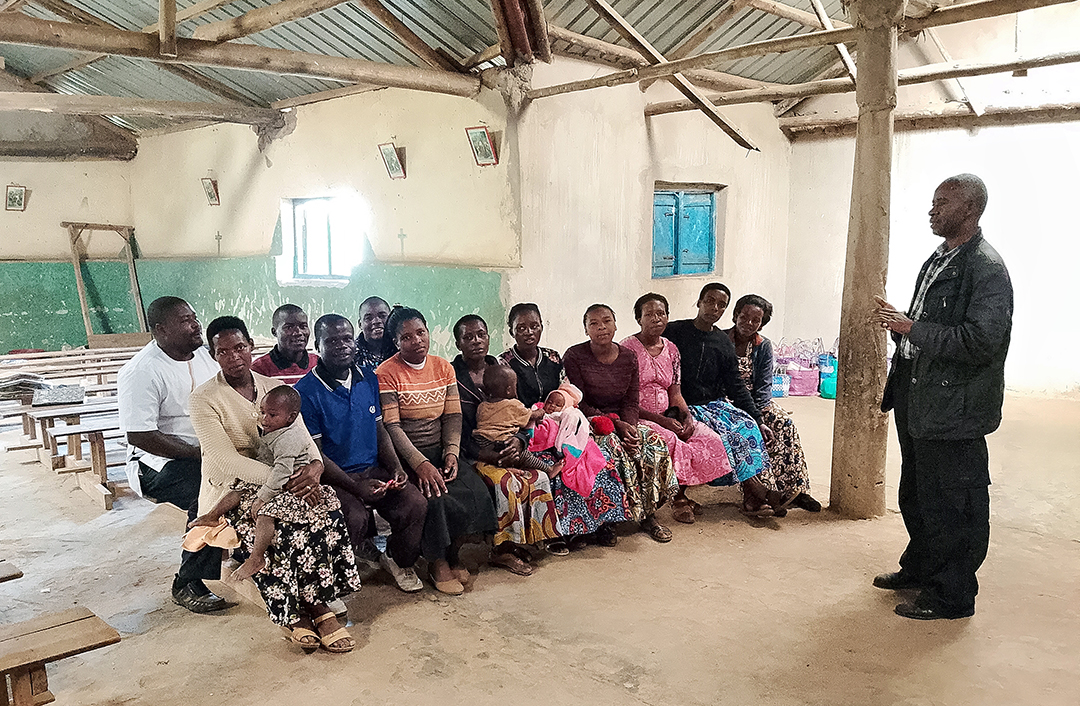
Krizanti sharing some good news with the teaching staff at the school.
Enrolment at St. Peter's Primary School has grown tremendously from under 50 students in 2017 to now over 350 students in 2025. What are the two biggest reasons why you think the school has been so successful in attracting new students?
This is an easy question to answer. First reason – parents want to send their children to our school because they know students get an excellent education in our classrooms. Our enviable achievement on the P.L.E. speaks loud and clear as proof of our capacity to deliver on the promise. Second reason – we excel at educating our students because we have a self-motivated, professional and experienced teaching staff that routinely exceeds student and parent expectations.
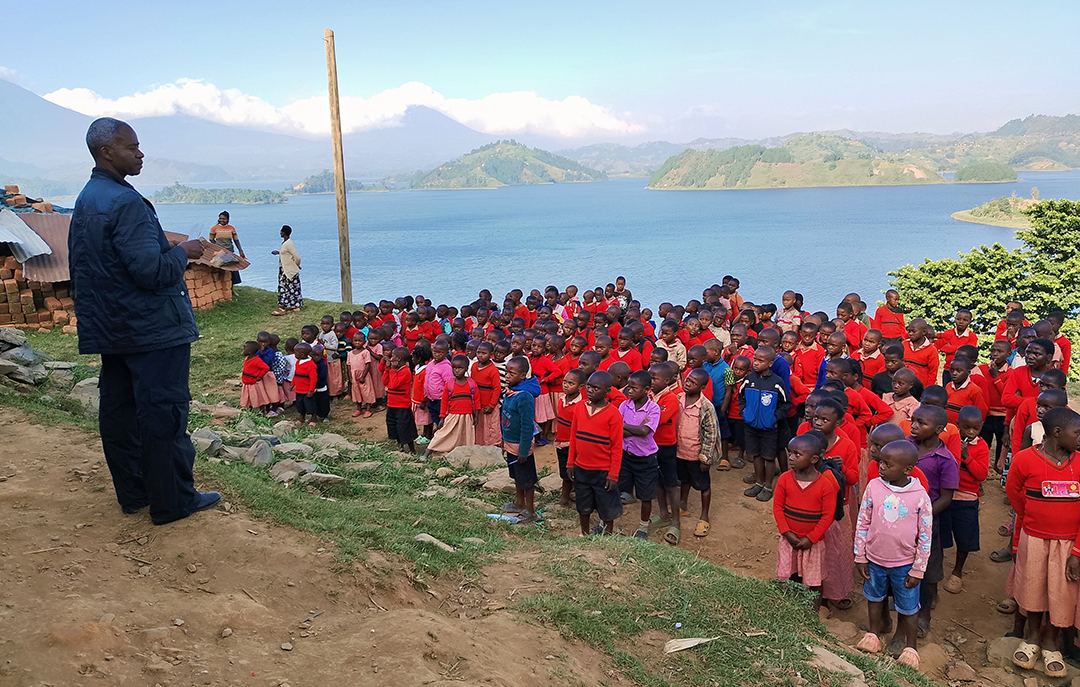
Krizanti addresses some of the school’s students and shares news of future plans for new classrooms.
Overcrowded classrooms are your biggest challenge at this time. Assuming this will be solved, look further down the road. What is the biggest challenge that you think the school will face in the next 10 years?
There are lots of challenges facing our little school in the next decade. Let me mention two of them. First, without a consistent and predictable source of funding, we will always face shortages. As our enrolment has increased, we have had to scramble to find sufficient number of classroom desks and other basic instructional materials like books, paper and pens and pencils. Without a student hostel, we cannot attract students from a distance. Second, because we are self funded, we cannot always compete when it comes to teacher wages. We fear losing our talented teachers to more lucrative government jobs in education.
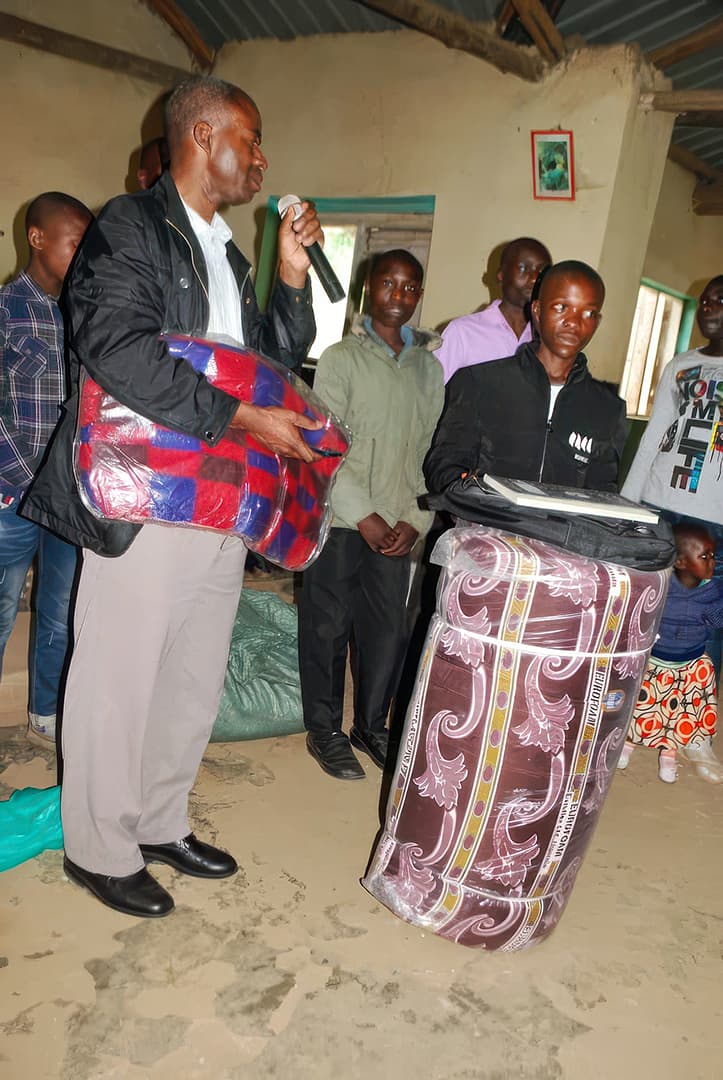
Krizanti presents a gift from the Parent Council to a graduating student who will need the mattress when he boards at secondary school.
Right from its beginning days, the school has not asked for nor received any government funding. Explain why the school community made this decision. Do you think this decision needs to change in the near future?
We decided not to become a government funded school because, when we looked around us, we did not like what we saw. Despite the appearance of having more than we did, government supported schools were poorly run and they did not perform well in national exams compared to privately run schools like us. The percentage of student drop-outs in our “public” schools is higher and teachers working there, though they may be somewhat better compensated, seem less motivated to go beyond basic instructional expectations.
By keeping local community control over the hiring and firing of our teachers, parents have a greater sense of involvement or investment in their child’s education. I doubt our decision to go it alone will change anytime soon.
You have plans to build new classroom spaces in the near future. Imagine a wealthy donor offered you the following "gifts" but said you must pick only one. Which would you choose to accept and explain why? (1) Electricity generated by solar panels (2) A shipping container full of books - the start of a school library (3) Teacher resources for classroom use like a computer and large TV screen (4) Internet access through a dedicated satellite connection or (5) $10,000.00 USD cash
Each of these items would be welcome additions at St. Peter’s. But, as Chair of the Parent Council, I need to take a longer term view of our needs. In such a role, I would accept the cash gift with gratitude. Cash would allow us to meet both immediate (and emergency) needs (like student desks) and also help us to further plan and support some of our longer term future projects like additional new classrooms, a school canteen and maybe even a retail craft shop for our many visitors.
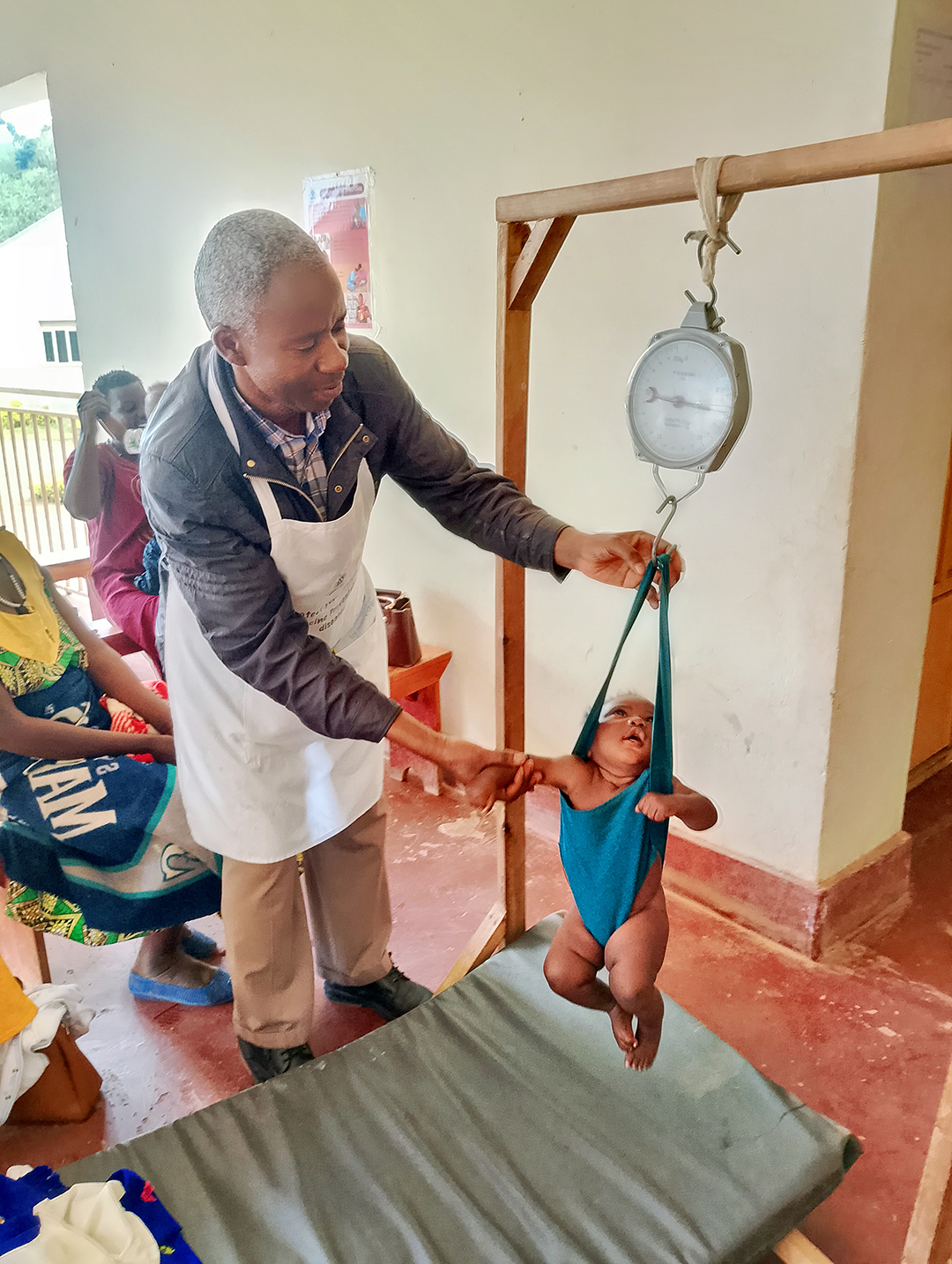
One of his responsibilities as a “comprehensive nurse” is to monitor the weight of young children.
Being Chair of the Parent Council is not your only full time job. What kind of work do you do - away from the school - that helps you pay your own bills?
I am employed as a “comprehensive nurse” here in rural southwestern Uganda. I have been trained to provide a wide assortment of health services to members of my village and surrounding communities. I guess you could say that I offer a range of preventive, promotive, curative and rehabilitative care to my patients. I am the local and familiar face of Public Health in Uganda. I operate out of a community clinic/pharmacy that I own. To supplement my income, I also own a milling machine that grinds corn for people and I grow and sell Irish potatoes for the domestic market.
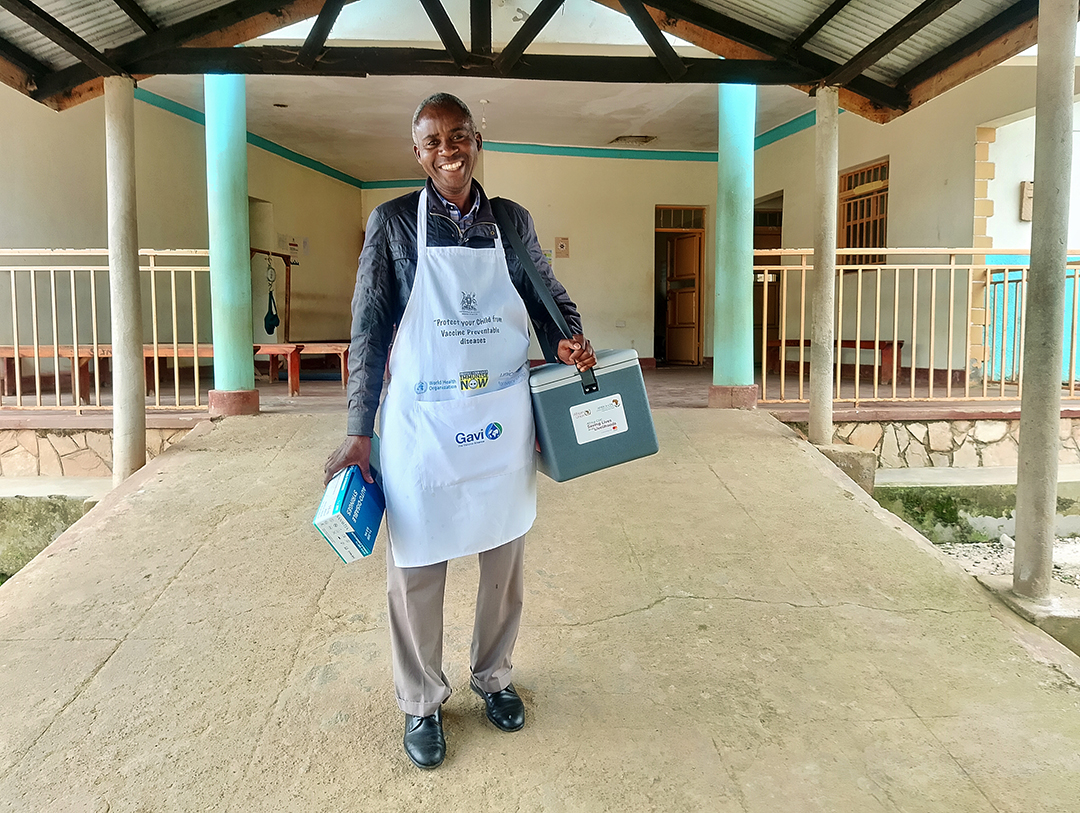
Krizanti outside his community clinic in the nearby village of Mukozi.
What is your favourite colour?
Red.
What languages do you speak?
English and my mother language – Rufumbira.
What is the furthest place you have travelled to away from home?
Kigali in Rwanda.
What country would you most like to visit at some point in the future?
Canada.
What is your favourite food to eat?
A mixture of bananas, beans, peas, Irish potatoes, sweet potatoes and green vegetables.
What is your favourite word?
Education.
What is your least favourite word?
Ignorance.
What profession, other than your own, would you most like to attempt?
Teacher.
What sound or noise (not including music) do you love the most?
People cheering or clapping as they celebrate an achievement.
What sound or noise (not including music) do you hate the most?
Students bullying new students in school or damaging any property.
What single adjective do you think best describes yourself?
Determined.
What single adjective do you think most often other people use to describe you?
Dedicated..
Thank you for your time Krizanti.
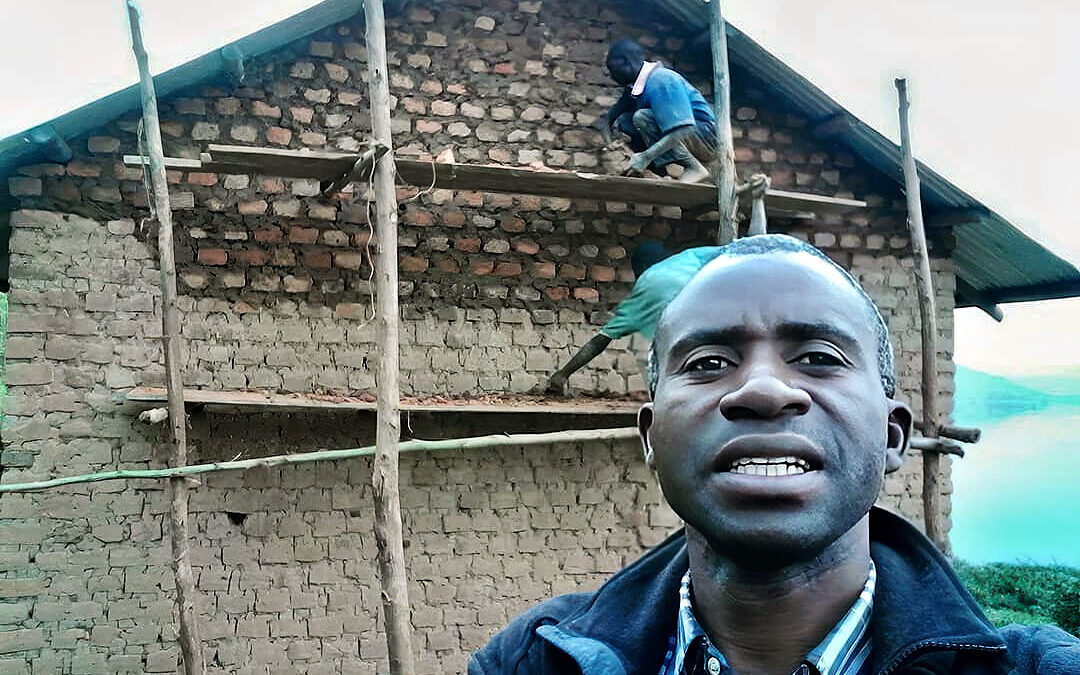
What an amazing interview. Thank you, Krizanti for allowing me to get to know you better through this interview. I am so proud of the work you do. You are such a terrific role model for the young students. They are so lucky to have you and your dedicated, determined spirit assisting the growth of their school, as well as, their lives. I am pleased and proud to say I enjoy being connected to you, your students, staff and the school through our Linked By Ink project. Keep up your important and great work!